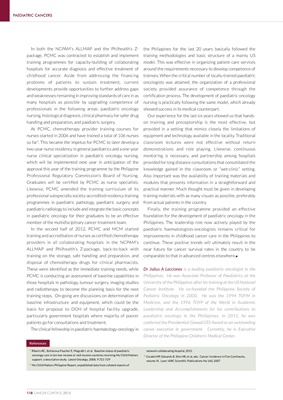
PAEDIATRIC CANCERS
In both the NCPAM’s ALLMAP and the Philhealth’s Z- the Philippines for the last 20 years basically followed the
package, PCMC was contracted to establish and implement training methodologies and basic structure of a mainly US
training programmes for capacity-building of collaborating model. This was effective in organizing patient care services
hospitals for accurate diagnosis and effective treatment of around the requirements necessary to develop competence of
childhood cancer. Aside from addressing the financing trainees. When the critical number of locally-trained paediatric
problems of patients to sustain treatment, current oncologists was attained, the organization of a professional
developments provide opportunities to further address gaps society provided assurance of competence through the
and weaknesses remaining in improving standards of care in as certification process. The development of paediatric oncology
many hospitals as possible by upgrading competence of nursing is practically following the same model, which already
professionals in the following areas: paediatric oncology showed success in its medical counterpart.
nursing, histological diagnosis, clinical pharmacy for safer drug Our experience for the last six years showed us that hands-
handling and preparation, and paediatric surgery. on training and preceptorship is the most effective, but
At PCMC, chemotherapy provider training courses for provided in a setting that mimics closely the limitations of
nurses started in 2006 and have trained a total of 106 nurses equipment and technology available in the locality. Traditional
2
so far . This became the impetus for PCMC to later develop a classroom lectures were not effective without return
two-year nurse residency in general paediatrics and a one-year demonstrations and role playing. Likewise, continuous
nurse clinical specialization in paediatric oncology nursing, mentoring is necessary, and partnership among hospitals
which will be implemented next year in anticipation of the provided for long distance consultations that consolidated the
approval this year of the training programme by the Philippine knowledge gained in the classroom or “wet-clinic” setting.
Professional Regulatory Commission’s Board of Nursing. Also important was the availability of training materials and
Graduates will be certified by PCMC as nurse specialists. modules that presents information in a straightforward and
Likewise, PCMC amended the training curriculum of its practical manner. Much thought must be given in developing
professional subspecialty society-accredited residency training training materials with as many visuals as possible, preferably
programmes in paediatric pathology, paediatric surgery and from actual patients in the country.
paediatric radiology to include and integrate the basic concepts Finally, the training programme provided an effective
in paediatric oncology for their graduates to be an effective foundation for the development of paediatric oncology in the
member of the multidisciplinary cancer treatment team. Philippines. The leadership role now actively played by the
In the second half of 2012, PCMC and MCM started paediatric haematologists-oncologists remains critical for
training and accreditation of nurses as certified chemotherapy improvements in childhood cancer care in the Philippines to
providers in all collaborating hospitals in the NCPAM’s continue. These positive trends will ultimately result in the
ALLMAP and Philhealth’s Z-package, back-to-back with near future for cancer survival rates in the country to be
training on the storage, safe handling and preparation, and comparable to that in advanced centres elsewhere.l
disposal of chemotherapy drugs for clinical pharmacists.
These were identified as the immediate training needs, while Dr Julius A Lecciones is a leading paediatric oncologist in the
PCMC is conducting an assessment of baseline capabilities in Philippines. He was Associate Professor of Paediatrics at the
those hospitals in pathology, tumour surgery, imaging studies University of the Philippines after his training at the US National
and radiotherapy to become the planning basis for the next Cancer Institute. He co-founded the Philippine Society of
training steps. On-going are discussions on determination of Pediatric Oncology in 2000. He was the 1994 TOYM in
baseline infrastructure and equipment, which could be the Medicine, and the 1996 TOYP of the World in Academic
basis for proposal to DOH of hospital facility upgrade, Leadership and Accomplishments for his contributions to
particularly government hospitals where majority of poorer paediatric oncology in the Philippines. In 2011, he was
patients go for consultations and treatment. conferred the Presidential Gawad CES Award as an outstanding
The clinical fellowship in paediatric haematology-oncology in career executive in government. Currently, he is Executive
Director of the Philippine Children’s Medical Center.
References
1.
Ribeiro RC, Steliarova-Foucher E, Magrath I, et al. Baseline status of paediatric network collaborating hospital, 2011
oncology care in ten low-income or mid-income countries receiving My Child Matters 3.
Curado MP, Edwards B, Shin HR, et al, eds. Cancer Incidence in Five Continents,
support: a descriptive study. Lancet Oncology, 2008, 9:721-729 volume IX. Lyon: IARC Scientific Publications No 160, 2007
2.
My Child Matters Philippine Report, unpublished data from collated reports of
118 CANCER CONTROL 2013